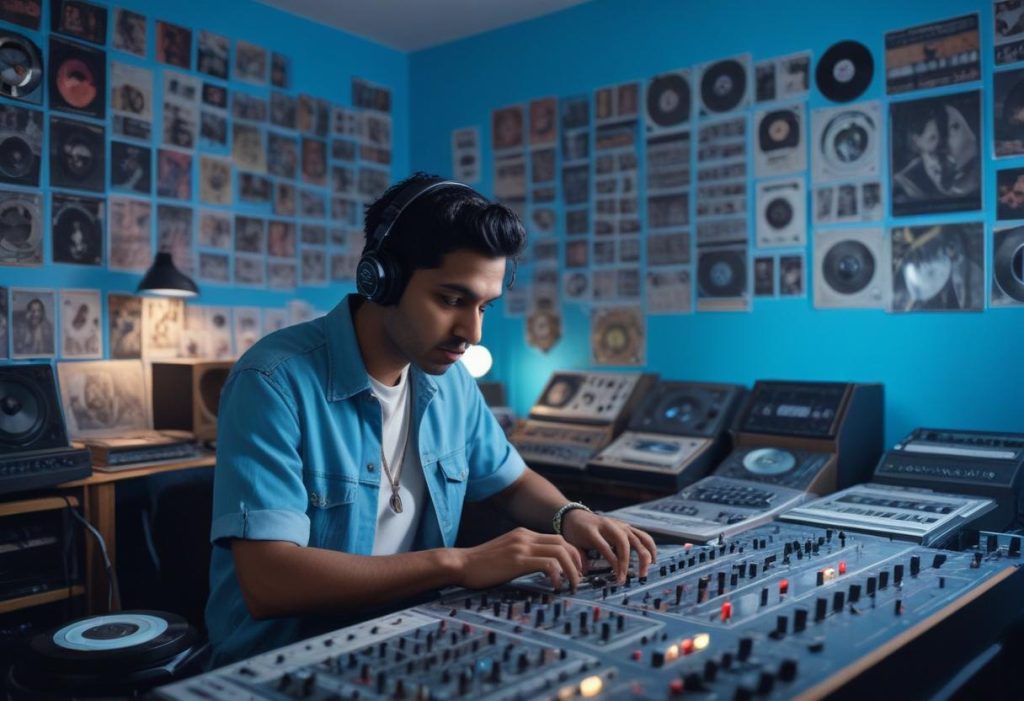How to Start a Career in Music Production? A Step-by-Step Guide
Music brings people together. It is one of the art forms that has been around since the beginning of time, evolving with the civilizations and their changing needs. A music production course today can promise a fun and rewarding career. You can explore the art, mix technology with tradition, produce novel tracks, and experiment endlessly with digital workstations and recording and mixing software.
Follow our step-by-step guide to find all the answers you are looking for and How to start Career in Music Production
1. Work On Your Musical Skills
Train your ears to identify intricacies, and notice chords, notes, and other elements that sets a track apart. You can take music classes to fine-tune your senses and get introduced to Indian and Western forms.
You can also learn how to write music, get to know the different forms and structures, and the elements of music coming together to form compositions.
2. Develop Some Technical Knowledge & Skills
Technical skills form an important part of the curriculum in any music school. While the course will guide you through these, being familiar with some essential ones will help you get ahead. Start to develop a few of the skills to get a kickstart in your music production career –
- Sound Recording
Sound recording is one of the fundamental skills in music production. It helps you capture and shape a sound, ensures the sound is high-quality and helps with consistency across different tracks. Understanding the technical aspects of sound recording helps with fixing any audio issues and comes in handy in a professional music production course.
- Mixing
Mixing combines art and technicalities. Once a sound is recorded, it needs polishing, refinement, and enhancing certain qualities. This part is called mixing.
Read Also: Top Trends in Music Education for 2024: What’s New and Exciting?
Properly mixing and balancing a soundtrack needs a thorough understanding of the elements of music, and paying attention to every little detail. Exploring sound mixing can help you clear personal interviews with any of the best music schools in the country and approach professionals for internship opportunities early on in your career.
- Familiarity with DAW
DAWs help with recording, editing, and producing soundtracks. Familiarity with the common DAW software can help you get used to the medium, explore the field by experimenting and creating tracks, and easily collaborate with other aspiring music producers. Getting accustomed to popular industry tools like this one is a great way to make your music production career a memorable journey.
3. Get a Degree
While you work on some of the most essential skills and refine your knowledge, a formal course in music production is always helpful in providing the right guidance. The structured curricula can fuel your creativity, improve your critical thinking and problem-solving skills, and channel your creative drive.
BA in Music Production
The course focuses on the fundamentals of music theory and various elements of music. You will how to compose, record, mix, and program soundtracks. You will understand DAWs like LogicPro and Ableton Live, and work with other digital tools. You would explore equalization, creating multi-layered tracks, dynamics processing, handling equipment, and much more.
Duration – 3 Years
MA in Music Production
It is an advanced degree in music production that deals with the fundamentals of music and music theory. It will give you an idea of Music business and throw light on the functioning of the industry. You will also explore the vast music tradition of India through folk music, gharanas, and regional music. Sequencing audio samples, MIDI instruments, and working with DAW are important parts of the program as well.
Duration – 2 Years.
Diploma in Music Production
You will explore different equipment, understand audio consoles, and compressors, and work with DAWs. The curriculum will prepare you to keep up with the industry by familiarizing yourself with the various emerging digital recording and audio production software.
Duration – 1 Year
Diploma in Sound Recording and Sound Design
Offered by FTII, this PG Diploma course will take you through the various theories and practical-based knowledge required in the industry. You will learn to analyze, reproduce, and record sounds, and study the fundamentals of sound design. You will get hands-on experience through group projects, working with acclaimed professionals, and exploring analog and digital equipment.
Duration – 3 Years
Read Also: India’s Highest Paying Certificate Courses for 2024: Top Job Opportunities
4. Specialize In a Skill through Certification Courses
Certificate courses in music production can help you be proficient in a niche you are interested in and make your resume more impactful. The best part is, that you can complete these alongside your degree courses, internships, and even jobs.
| Course | Duration in Months | Course Contents |
| Music Business Management | 2 – 12 | Branding, Distribution & PR Industry Functions Commercialization of Music PR, Copyright Laws, Legal frameworks. Organizing shows & Concerts Image Creation |
| Sound Design | 12 | Gears and Equipment Sound Mixing and Recording Music Theory Working with DAW, Synthesizers, Equalizers Fusing and Reproducing tracks |
| Music Theory | 12 | Training the Ear Principles of Music Theory Creating & Analysing Compositions Indian and Western Music Theory |
| Understanding the Music Industry | 1-2 | Publishing and Copyright Licensing Recording Industry Live Music Industry Online Market |

5. Collaborate with professionals
You can get together with a team of professionals to explore and experiment with your tracks. Collaboration can generate beautiful ideas, help create unique soundtracks, and develop communication skills.
Read Also: Creative Education in the Digital Age: Challenges and Opportunities
No music producer works alone in the industry. There’s always a team of people working together and adding value to a track with their specialized skills. Producing music with fellow artists and aspiring music producers will add to your resume and help the recruiters and clients understand your versatility and ability to work in teams.
6. Prepare a Portfolio of Your Work
When you are enrolled in a professional music production course, you will work towards building an impactful portfolio. Sit down and shortlist the work that you feel best represents your style. You can include distinct soundtracks to showcase your versatility or focus on something specific to emphasize your specialization. You can present a portfolio in the form of –
- Showreel
- Audio Files of Compositions
- Music Videos
- A video of making the track along with the outcome
- Live Recordings
Read Also: How Music Classes Can Help You Achieve Your Musical Goals
Keep in mind their duration and present it in a way that engages the viewers. Remember, your portfolio will help recruiters and potential clients get a glimpse of your perceptions, skills, and talent.
7. Internships
If you go through the curricula of music production courses, you will probably see internships, workshops, and classroom projects are an essential component. Internships provide a hands-on experience that’s necessary to navigate the industry. Working alongside professionals, you will learn to
- Handle microphones and other tools and equipment
- Be familiar with DAW, equalization, dynamics processing
- Mix Audio
- Operate analog and digital audio systems and MIDI programming
Understanding how the industry works will help you when you’re reaching out to recruiters for job roles.
8. Get in Touch with HR Managers
The final step in getting your music production career started is to contact HR managers and potential recruiters.
Read Also: Unlocking Creativity: The Role of Technology in Modern Education
- Keep an eye on vacancies through company websites and other professional platforms.
- You can also reach out to your network enquiring about available jobs.
- Send out cold emails and cover letters.
- Circulate your portfolio.
- Build a strong profile on LinkedIn or a similar platform to help clients and recruiters discover you.
End Note
The music industry is rapidly changing. As an aspiring music producer, you will need to keep up with the dynamism, the shifts, and the innovations that come along.
If this sounds like you, check out the AAFT School of Music and browse through the music production courses. The well-structured courses are designed to prepare you for any complexity and provide hands-on training. You will get introduced to music theory and Western and Indian music, and understand how to work with modern equipment including DAWs. AAFT provides all the resources and opportunities you need to pursue a rewarding music career.











